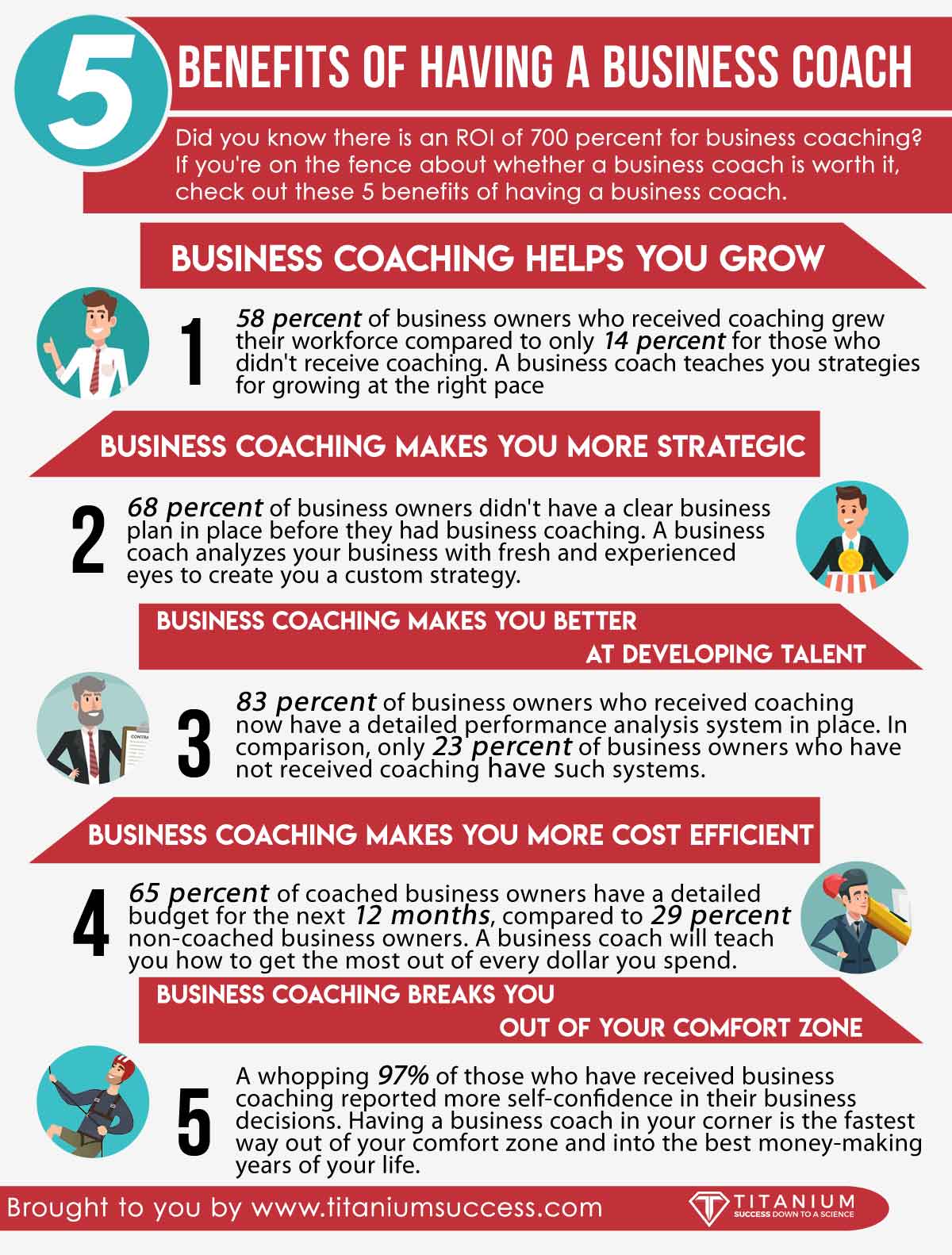In today’s rapidly evolving business landscape, entrepreneurs, executives, and business owners constantly face new challenges. Whether it’s about scaling operations, improving leadership, or navigating complex markets, many have turned to business coaches for guidance. But the question remains: Is it worth it to get a business coach?

A business coach is a professional advisor who helps individuals and organizations clarify their goals, create actionable strategies, and improve both personal and professional performance. Unlike mentors, who may provide informal guidance based on experience, or consultants, who often solve specific problems for you, a business coach partners with you to unlock your potential and achieve specific business objectives.
Key Roles of a Business Coach
- Clarity: Helps you define clear goals for your business and personal growth.
- Accountability: Keeps you focused on your priorities and tracks progress.
- Feedback: Provides objective insights into your business and personal decisions.
- Strategic Planning: Guides you in developing a clear strategy for long-term success.
Difference Between a Business Coach and Other Advisors
- Business Coach: Focuses on empowering you to find solutions and grow as a leader.
- Mentor: Offers advice based on their own experiences but may not focus on tailored strategy.
- Consultant: Provides expert solutions for specific issues without necessarily focusing on your personal development.
Areas of Focus for Business Coaching
A business coach typically works on:
- Leadership development
- Improving business processes and efficiency
- Boosting team dynamics and morale
- Personal growth and work-life balance
Coaching sessions may vary, but they often include structured conversations aimed at achieving measurable outcomes.
Example: “I was at a crossroads with my business. My revenue was stagnating, and I didn’t know where to go next. My business coach helped me refocus my efforts, streamline my processes, and within six months, I saw a 20% increase in profits. Their insights were invaluable to getting me back on track.” — James P., Small Business Owner

How Does Business Coaching Work?
Business coaching is a highly personalized process that revolves around structured interactions between the coach and the client. The core goal is to help you achieve your business and personal objectives through ongoing guidance, feedback, and accountability. But how exactly does the process work, and what can you expect from a coaching engagement?
The Process of Business Coaching
A typical business coaching process involves several key stages:
- Initial Assessment
The first stage involves assessing your current business status, challenges, and goals. The coach might ask questions like:- What are your short-term and long-term business objectives?
- What are the biggest obstacles you’re facing right now?
- Where do you see your business in the next 5 years?
This helps both you and your coach gain clarity on the areas that need improvement and the goals to focus on.
- Goal Setting
After the initial assessment, the coach will help you create specific, measurable, achievable, relevant, and time-bound (SMART) goals. This is crucial because vague or broad goals can make progress difficult to measure. The business coach will assist in breaking down larger goals into actionable steps. - Action Plan Development
Once the goals are set, the coach works with you to create an action plan. This plan outlines the steps you need to take to reach your goals, along with a timeline for each step. The plan is flexible and can be adjusted as your business evolves. - Ongoing Coaching Sessions
Regular sessions (weekly, bi-weekly, or monthly) are conducted to review progress, address challenges, and adjust strategies as needed. These sessions can be in-person or virtual, depending on your preferences. During each session, the coach will:- Review progress: What goals have you achieved so far?
- Identify obstacles: What challenges are preventing further progress?
- Adjust strategies: Are any changes needed in the approach?
- Feedback and Accountability
One of the most valuable aspects of coaching is the continuous feedback and accountability. The coach not only provides guidance but also ensures you remain focused on your priorities. This external accountability is often the key to maintaining momentum and avoiding procrastination.
Typical Formats of Business Coaching
Business coaching comes in different formats depending on the needs of the client:
- One-on-One Coaching: The most common form, offering personalized, in-depth guidance tailored to your specific situation.
- Group Coaching: Involves multiple business owners or executives, providing a shared learning experience and often reducing costs.
- Online Coaching: Remote coaching through video calls, which offers greater flexibility and accessibility.
- Hybrid Coaching: A combination of in-person and virtual meetings for clients who need more flexibility but also value face-to-face interaction.
Duration and Commitment Levels
The length of time you engage with a business coach varies based on your goals and needs. Some businesses may need only a few months of coaching to address a specific issue, while others may work with a coach for years to continually refine and improve their operations.
- Short-Term Coaching: Typically 3–6 months to address specific business challenges or goals.
- Long-Term Coaching: Lasts over a year or more, focused on broader business development and personal growth.
Example of a Coaching Schedule:
| Session Number | Focus Area | Duration | Outcome Expected |
|---|---|---|---|
| 1 | Initial Assessment & Goal Setting | 1 hour | Clear business goals and initial roadmap |
| 2 | Strategy Development | 1 hour | Customized business strategies |
| 3 | Progress Review & Feedback | 45 mins | Adjustments to action plan |
| 4+ | Ongoing Coaching | 45 mins | Continuous improvement and goal tracking |
Case Study: How Business Coaching Works in Practice
“I run a mid-sized retail business, and while we were doing okay, I knew we had untapped potential. After hiring a business coach, we set ambitious but achievable goals. My coach helped me implement better inventory management processes and refine our marketing strategy. Over the course of a year, my revenue increased by 30%, and I developed stronger leadership skills that allowed me to better manage my team.” — Sarah L., Retail Business Owner
The structure and consistency offered by a business coach can be transformative. Their ability to keep you on track and provide objective insights makes business coaching a valuable process for growth.

Who Should Consider Hiring a Business Coach?
The decision to hire a business coach is not limited to large corporations or top-level executives. Business coaching can benefit a broad spectrum of individuals and organizations, from small startups to established enterprises. However, certain signs and circumstances indicate when hiring a business coach is particularly valuable.
Who Benefits the Most from Business Coaching?
- Entrepreneurs and Small Business Owners
Entrepreneurs and small business owners often find themselves juggling multiple responsibilities—from operations and marketing to finance and HR. A business coach can help streamline these tasks and offer clarity, making it easier to focus on what truly drives growth. For those just starting out, coaching provides essential guidance in forming a strong foundation and avoiding common pitfalls. - Executives and Managers
At the executive or managerial level, business coaching is focused on improving leadership and decision-making skills. Business coaches can assist in navigating corporate politics, improving communication with teams, and sharpening strategic planning abilities. Coaching also helps executives deal with high-stakes challenges like mergers, acquisitions, or entering new markets. - Businesses Facing Stagnation
If your business is no longer growing, or growth has plateaued despite your best efforts, a coach can help identify the root causes. Often, external factors like market shifts or internal issues like inefficient processes or poor team dynamics can halt progress. A business coach can pinpoint these barriers and offer actionable solutions. - Leaders Seeking Work-Life Balance
Many business owners and executives struggle with work-life balance, often experiencing burnout from long hours and high stress. Business coaches not only help you manage your business better but also provide tools for improving personal productivity, stress management, and time allocation. - Individuals at Key Transition Points
Business owners who are preparing for significant transitions—whether it’s scaling the company, selling the business, or stepping into a new market—can benefit significantly from a coach’s expertise. A coach helps ensure that these transitions are managed smoothly and strategically, minimizing risk and maximizing opportunities.
At What Stage of Business Growth Should You Consider a Business Coach?
There is no “one-size-fits-all” stage when it comes to hiring a business coach. However, there are certain milestones where coaching becomes especially valuable:
- Startups: When building the foundation of your business, a coach can provide guidance on everything from business planning to customer acquisition strategies.
- Growth Phase: If your business is scaling rapidly and you’re struggling to keep up, a coach can help you manage this growth more effectively. They will guide you in areas like team expansion, operations management, and market penetration.
- Maturity: Businesses that have been around for a while but are looking to innovate or expand into new areas can benefit from a coach who brings fresh ideas and strategies to the table.
- Decline or Stagnation: If your business is declining or experiencing a prolonged stagnation, a coach can help identify the underlying issues and create a recovery or pivot strategy.
Signs You Might Need a Business Coach
1. You’re Feeling Overwhelmed or Stuck
If you’re overwhelmed by the daily operations of your business or stuck in a cycle of decision paralysis, a business coach can help clear the fog. A coach can offer you a fresh perspective on your challenges and help you focus on solutions rather than problems.
2. Lack of Clear Direction
Not having a clear vision or strategy for the future of your business is a strong indicator that a business coach may be helpful. They assist in aligning your day-to-day actions with your long-term objectives, ensuring that your efforts are consistently moving you toward your goals.
3. Poor Team Dynamics or Leadership Issues
If you’re experiencing problems with team dynamics, such as poor communication, lack of accountability, or low morale, a business coach can help you become a more effective leader. They can guide you in improving your management style, fostering a positive team environment, and enhancing overall productivity.
4. Plateauing Revenue or Growth
If your revenue or business growth has stagnated, and you’re unsure why, a business coach can help diagnose the issues. Sometimes, it might be a marketing problem, while other times it could be operational inefficiencies or leadership gaps. A coach can provide you with an objective view and strategic solutions.
5. You’re Facing Major Decisions or Transitions
Big decisions—whether it’s expanding to a new market, developing a new product line, or considering a merger—can be daunting. Business coaches have experience guiding companies through these crucial moments, helping you weigh risks, assess opportunities, and make more confident decisions.
Case Study: An Entrepreneur’s Success with Business Coaching
“I was running a small tech startup, and we had just secured our first major round of funding. With so many new responsibilities and expectations, I felt overwhelmed and unsure of how to scale the company effectively. Hiring a business coach was the best decision I made. Not only did they help me map out a clear growth strategy, but they also worked with me on improving my leadership skills. Within a year, our team had doubled in size, and we were on track to triple our revenue. The coach gave me the clarity and confidence I needed to take my business to the next level.” — Emily S., Tech Startup Founder
A business coach can be an invaluable resource for many different types of business professionals, especially those at critical junctures in their careers or business growth. Whether you’re a small business owner, an executive, or an entrepreneur, the right coach can offer insights and tools that will propel you forward.

Benefits of Hiring a Business Coach
Business coaching offers numerous advantages, ranging from personal development to measurable improvements in business performance. Whether you’re seeking guidance in leadership, strategy, or growth, the benefits of hiring a business coach can significantly outweigh the cost. Below, we dive into the key benefits that make business coaching an investment worth considering.
1. Accountability and Focus
One of the most significant advantages of hiring a business coach is the accountability they provide. Often, business owners or leaders have ambitious goals but struggle to stay on track amidst daily operations. A coach ensures that you remain focused on the tasks that drive results and prevents you from veering off course.
How Accountability Works in Coaching
- Regular check-ins: Business coaches hold weekly or bi-weekly sessions to review your progress and set new objectives.
- Action plans: A coach will help you develop a clear action plan and ensure you adhere to it.
- Real-time feedback: They provide constructive feedback that helps you adjust and improve your actions, keeping you accountable for the outcomes.
For instance, if you’re struggling with time management or delegating tasks, a coach will identify these bottlenecks and help you overcome them by creating systems that boost productivity.
2. Personalized Strategy and Growth Plans
Every business is unique, and there is no universal strategy for success. One of the key benefits of a business coach is the development of a personalized strategy tailored to your specific business needs, goals, and challenges. A coach works closely with you to assess where your business stands, identifies growth opportunities, and crafts a roadmap for achieving those goals.
Personalized Strategy in Action
- Targeted growth plans: A coach will assess market trends, your industry, and your business’s internal strengths and weaknesses to develop a plan that maximizes growth.
- Goal alignment: They ensure that your short-term goals align with your long-term vision, preventing missteps that could slow your progress.
- Scalability: As your business grows, a coach helps you pivot or adjust strategies to accommodate that growth without losing sight of your core objectives.
For example, if you’re looking to expand into a new market, a business coach can help you map out the process—from market research to product development, and marketing strategies to operational logistics.
3. Improved Leadership Skills
A business coach doesn’t just focus on the business itself—they also work on improving your leadership capabilities. Effective leadership is critical for long-term success, and business coaching can help you develop skills like communication, decision-making, and team management.
Key Leadership Skills Coaches Develop
- Effective communication: Learn how to communicate your vision and strategies clearly to your team, investors, or stakeholders.
- Decision-making: Coaches provide frameworks to make informed, strategic decisions quickly and efficiently.
- Empowering others: A coach will help you delegate tasks effectively, empowering your team to take ownership while you focus on higher-level responsibilities.
- Emotional intelligence: Understanding how to manage your emotions and those of your team is crucial for maintaining a healthy, productive work environment.
4. Networking and Access to Resources
Many business coaches come with an extensive professional network that can benefit you and your business. Whether it’s connections to potential clients, partners, or other business leaders, your coach can introduce you to individuals and resources that you might not have access to on your own.
Networking and Resources Provided by Coaches
- Introductions to key industry players: Coaches often have strong connections in various industries, giving you access to opportunities you wouldn’t otherwise have.
- Access to tools and frameworks: Coaches share business development tools, performance tracking software, or proven frameworks to streamline your operations.
- Collaborative opportunities: Through a coach’s network, you may find partnerships that help your business grow faster or gain market share.
5. Objective Feedback
As a business owner or executive, it’s easy to become too close to your company to see potential problems or areas of improvement. A business coach provides objective, unbiased feedback, which can help you identify blind spots or inefficiencies that you may have overlooked.
Benefits of Objective Feedback
- Honest evaluations: Coaches don’t sugarcoat issues, which means you get honest, actionable feedback.
- External perspective: They bring a fresh set of eyes to your business, allowing for more innovative and creative problem-solving.
- Pinpointing weaknesses: A coach can highlight weaknesses in your strategy, leadership, or operations and help you address them.
For example, if your marketing strategy isn’t producing results, a coach can offer an objective analysis and suggest alternative approaches.
6. Work-Life Balance
Achieving a balance between personal life and business responsibilities is a common challenge for many business owners and leaders. Burnout, stress, and long hours are typical, but a business coach can help you manage your time more effectively, allowing for a healthier work-life balance.
How Coaching Helps Improve Work-Life Balance
- Time management strategies: A coach helps you prioritize tasks, delegate responsibilities, and implement time management techniques that free up your schedule.
- Stress management: Coaches often provide tools and techniques for managing stress and staying focused without overloading yourself.
- Personal goals alignment: They encourage you to set personal goals alongside business goals, ensuring that your well-being is not neglected.
Case Study: Improved Leadership and Focus through Business Coaching
“As a CEO of a growing tech company, I found myself constantly putting out fires and struggling to lead my team effectively. I hired a business coach to help me regain focus. Over the course of a year, my coach helped me redefine my role as a leader, delegate more tasks to my management team, and improve my communication skills. The result? Not only did the company’s performance improve, but I also found more time to focus on strategic initiatives and my personal life.” — Mark T., CEO of a Tech Startup
The benefits of business coaching are vast and go beyond the immediate gains in profitability or operational efficiency. From improving leadership skills to enhancing work-life balance, the right business coach can provide you with the tools, guidance, and support necessary to reach your fullest potential.